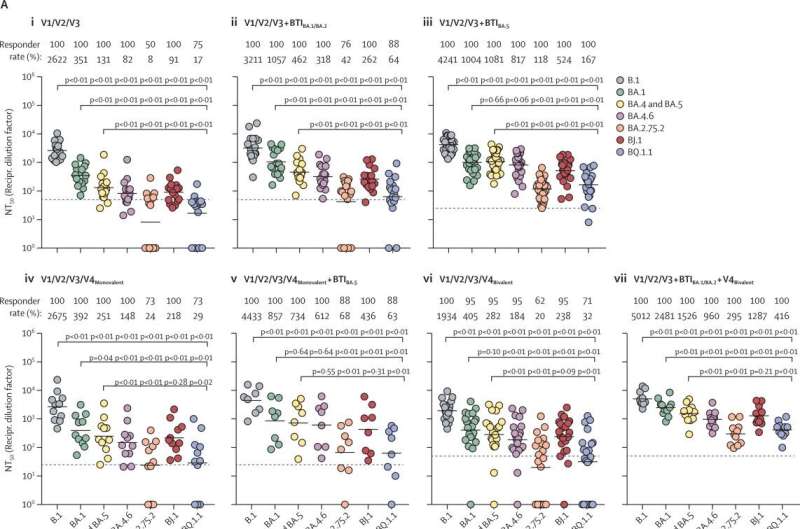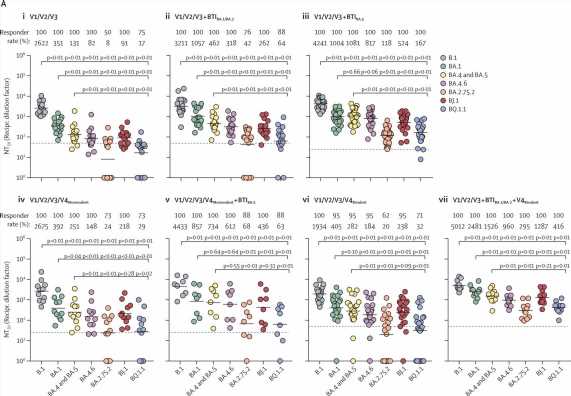
Should I get another booster? And if so, which vaccine should be used?
These questions are asked by many citizens who have received the basic immunization consisting of usually three individual vaccine doses. A team of researchers from the German Primate Center—Leibniz Institute for Primate Research in Göttingen and Hannover Medical School studied antibody-mediated neutralization of SARS-CoV-2 variants following a fourth vaccination with different vaccine boosters.
Their results showed that booster vaccination improved neutralization of SARS-CoV-2. Comparison of samples from those vaccinated with the BA.5-adapted vaccine and those who received the “classical,” non-adapted vaccine showed that vaccination with the BA.5-adapted vaccine resulted in slightly better neutralization.
However, the currently circulating omicron subvariants BA.2.75.2 and BQ.1.1 exhibited marked antibody escape as they were only weakly inhibited after booster vaccination. These results indicate that booster vaccination is generally useful, but offer only reduced protection against infection by BA.2.75.2 and BQ.1.1.
Infections with SARS-CoV-2 still lead to many hospitalizations worldwide. Vaccination protects against severe disease, in part by inducing the production of neutralizing antibodies. However, some variants of SARS-CoV-2 can partially evade antibody-mediated neutralization. This is referred to as antibody evasion.
In particular, the omicron variant carries numerous mutations in the spike protein that reduce sensitivity to antibody-mediated neutralization. Therefore, vaccines have been adapted to provide better protection against omicron subvariants. It is still unclear whether vaccination with the adapted vaccines leads to better neutralization of omicron subvariants than vaccination with the “classical,” non-adapted vaccines.
In addition, it is unknown to which extend the newly emerged omicron subvariants BA.2.75.2 and BQ.1.1 are able to evade neutralization by antibodies. In collaboration with researchers from the Hannover Medical School, researchers from the Infection Biology Unit at the German Primate Center have measured how well antibodies in the blood of vaccinated individuals can neutralize different omicron subvariants.
The results show that the blood of fully-vaccinated (three vaccine doses) individuals who have received a booster vaccination on top possesses higher neutralizing activity against omicron subvariants than the blood of fully-vaccinated individuals without booster vaccination. In this regard, neutralization of omicron subvariants was slightly more efficient following booster vaccination with the BA.5-adapted vaccine, compared to booster vaccination with the “classical,” non-adapted vaccine.
“Although our study revealed that booster vaccination with the BA.5-adapted vaccine led to higher neutralizing activity compared to a booster with the ‘classical,’ non-adapted vaccine, the difference was minor. However, in this context it is important to mention that we looked at a very early time point after booster immunization. It is therefore possible that differences become more prominent after some time, for example due to antibody maturation,” says Markus Hoffmann, first author of the study.
In the course of their investigations, the researchers also found that almost all individuals with a booster vaccination had neutralizing antibodies against the SARS-CoV-2 variant BA.5, which circulated during the summer season. In contrast, neutralizing antibodies against BA.2.75.2 and BQ.1.1 were only detected in some samples.
“The omicron subvariants BA.2.75.2 and BQ.1.1 show high capacity for evasion from antibody-mediated neutralization and it can thus be assumed that these variants cause symptomatic infection in some individuals despite booster vaccination,” says Stefan Pöhlmann, head of the Infection Biology Unit at the German Primate Center, and adds, “Samples from fully-vaccinated individuals with breakthrough infection during the first omicron wave in spring 2022 in Germany and subsequent booster vaccination with the BA.5- adapted vaccine demonstrated high neutralizing activity against all omicron subvariants tested. Accordingly, these individuals may be protected against symptomatic infection by omicron subvariants.”
“Our study shows that booster vaccination is generally useful to increase neutralizing activity against novel SARS-CoV-2 variants. Although BA.2.75.2 and BQ.1.1 strongly evade inhibition by neutralizing antibodies, partial protection against symptomatic infection by these variants can still be expected in immunized individuals, for instance by the T-cell-mediated immune response, which our study did not explicitly investigate,” Markus Hoffmann said.
The study is published in The Lancet Infectious Diseases journal.
More information:
Markus Hoffmann et al, Effect of hybrid immunity and bivalent booster vaccination on omicron sublineage neutralisation, The Lancet Infectious Diseases (2022). DOI: 10.1016/S1473-3099(22)00792-7
Journal information:
Lancet Infectious Diseases
Source: Read Full Article
